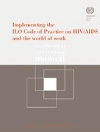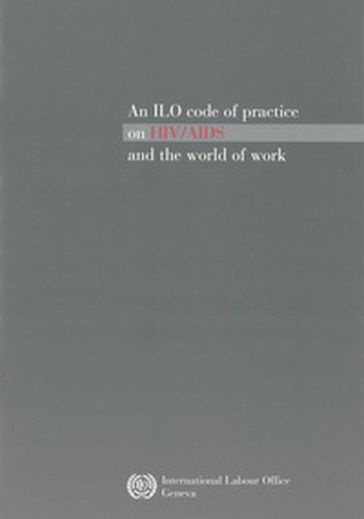Publications and technical tools
2003
-
Preventing and responding to violence at work
08 September 2003
Provides guidance on how to design, implement, and evaluate workplace violence prevention programmes and policies.
-
ILO standards-related activities in the area of occupational safety and health: An in-depth study for discussion with a view to the elaboration of a plan of action for such activities
26 May 2003
Based on a survey carried out among ILO constituents, this report is aimed at examining the impact, coherence and relevance of ILO standards and related activities in the area of occupational safety and health and to develop a consensus on a plan of action to increase their impact.
-
Safety in numbers: Pointers for a global safety culture at work
28 April 2003
On the World Day for Safety and Health at Work, we put the spotlight on promoting safety at work. This report sets out the challenges that we face and points the way ahead. Awareness must be accompanied by engagement and action. Working together with our constituents and other relevant actors, the ILO looks forward to being part of a renewed effort to promote safe work worldwide.
-
Alcohol and drug problems at work. The shift to prevention
11 January 2003
Provides background information and a framework for the development and implementation of a prevention-oriented approach to workplace alcohol and drug problems. This volume examines the advantages of establishing workplace substance abuse initiatives and shows how enterprises of all sizes can set up and implement their own programmes to deal with this growing problem.
-

Implementing the ILO code of practice on HIV/AIDS and the world of work. An education and training manual
10 January 2003
A valuable educational and training tool, this comprehensive manual offers practical guidance for formulating viable policies and programmes to combat HIV/AIDS in the world of work. Aimed at protecting the rights and dignity of workers, their families, and all people living with HIV/AIDS, the education and training material provided here can be applied to all sectors, public and private, formal and informal.
-
How to prevent accidents on small construction sites
01 January 2003
-
Company cases and cross-company initiatives: Working conditions improvement in Haiti
01 January 2003
The publication intends to report on some of the changes that have been taking place in Haitian garment factories as a result of the ILO-USDOL project "Improving working conditions and productivity in the garment industry in Haiti".
-
Technical Guidelines for the Environmentally Sound Management of the Full and Partial Dismantling of Ships, Basel Convention of UNEP, Geneva, 2003
01 January 2003
2002
-
Social dialogue in the health services. Institutions, capacity and effectiveness. Report JMHS/2002
12 September 2002
Describes approaches to social dialogue and the institutions required for its development, including ILO's role. Includes brief case studies from several countries.
-
Improved security of seafarer’s identification. Report 91 VII (1)
16 August 2002
International Labour Conference, 91st Session 2003. Report VII (1) This report reviews various means of increasing the security of seafarers' identification with a view to the adoption of a Protocol to the Seafarers' Identity Documents Convention, 1958 (No. 108).
-
Standards, Principles and Approaches in Occupational Health Services
01 July 2002
-
Labour inspection. A guide to the profession
24 April 2002
Labour Inspection is an authoritative, comprehensive guide to labour inspection and its fundamental principles. It emphasizes that labour inspection is a profession in its own right, and requires a professional approach. It presents policy issues in an international context, while examining how the major, foreseeable developments in economics, the labour market, technology, as well as national, sectoral, and enterprise social structures, affect labour inspection
-
New challenges and opportunities for occupational safety and health in a globalized world
01 April 2002
Globalisation of the economy has intensified over the recent years and, together with the development of the new information and telecommunications technology, it is bringing about radical changes in society, comparable to those produced during the industrial revolution. Occupational safety and health (OSH) cannot ignore those changes. And, in this context, the greatest challenge for the countries is the transformation of the difficulties involved in adapting to the new situation into opportunities for the future development of OSH.
-
Barefoot Economics: Assessing the economic value of developing an healthy work environment
01 February 2002
The objective of this publication is to provide a practical evaluation tool to entrepreneurs and all those actively involved in the decision making within enterprises, to meet this challenge by creating healthier and more productive workplaces. An attempt to present practical tools of a different type is given in this publication.
-
Labour inspection: A guide to the profession
01 January 2002
Provides guidance on labour inspection, its fundamental principles, its role, scope, policy, organization, management and functions. Identifies and analyses best practices in some high-performance inspection systems in ILO Member States.
-
Guidelines for the use of the ILO International Classification of Radiographs of Pneumoconioses, 2000 edition
01 January 2002
-
Health and safety at work: A trade union priority
01 January 2002
Figures appearing in this issue of Labour Education 2002/1 No. 126, are shocking: every day sees 5,000 people die from work-related accidents. That is three deaths every minute. Work-related diseases continue to take a heavy toll,affecting at any given time more than 160 million people in both developing and industrialized countries. This is an important issue for all of society, as these casualties help swell the pressures on increasingly stretched public health systems throughout the world. In consequence, the costs and the social impacts on communities have risen.
2001
-
The construction industry in the twenty-first century: Its image, employment prospects and skill requirements
29 October 2001
The report was prepared for the 2001 ILO Tripartite Meeting on the Construction Industry. The main theme of the report is changing employment relationships and industrial structures in the construction industry and the impact of these changes on the quality of employment in the industry. The report reviews changes in the construction industry in the 1990s and considers directions for the future.
-
Guidance for the prevention of stress and violence at the workplace
16 October 2001
This guidance addresses the nature of stress and violence at work, whether and how work stress and violence affect health and well-being, and what can be done to eliminate or reduce these problems. Employers, employees and their respective organisations are encourage to use this guidance, implement and continually refine their actions and programmes to eliminate and control the problems of stress and violence at work.
-

The ILO Code of Practice on HIV/AIDS and the World of Work
01 June 2001
The code provides invaluable practical guidance to policy-makers, employers’ and workers’ organizations and other social partners for formulating and implementing appropriate workplace policy, prevention and care programmes, and for establishing strategies to address workers in the informal sector. It is the product of collaboration between the ILO and its tripartite constituents, as well as cooperation with its international partners.

